#APIB
Explore tagged Tumblr posts
Text
Dia Nacional de Luta dos Povos Indígenas
Uma homenagem ao Dia Nacional de Luta dos Povos Indígenas. Uma homenagem à todas as guardiãs e todos os guardiões das florestas, das águas, da ancestralidade, da vida. Pelo fim das atrozes e centenárias tentativas de apagamento da história e das vidas dos povos originários brasileiros. O Marco Temporal segue a ser julgado pelo STF sob a interferência de ruralistas a fim de desmobilizar a…

View On WordPress
#ailtonkrenak#apib#brasildofuturo#capitalismo#celiaxakriabá#davikopenawa#dianacionaldelutadospovosindígenas#fascismo#guardiõesdafloresta#MarcoTemporalNão#meioambiente#ministériodospovosindígenas#raoni#savetheamazon#soniaguajajara
1 note
·
View note
Text
Ponto de não retorno, Marina Silva
A ministra do Meio Ambiente e Mudança do Clima, Marina Silva, propôs nesta terça-feira (16) um acordo para evitar que seja alcançado o “ponto de não retorno” de destruição da Amazônia. POLÍTICA LIVRE – 16 de maio de 2023 O Brasil deve defender esse pacto em agosto, durante encontro dos países que integram a OTCA (Organização do Tratado de Cooperação Amazônica). Mateus Vargas – Folhapress “Se a…
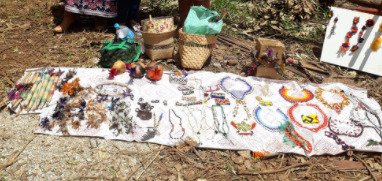
View On WordPress
#Alemanha e Reino Unido#as terras demarcadas têm potencial de produção sustentável e de preservação da floresta#áreas de infraestrutura e agronegócio#Bolívia#Brasil#Colômbia#comunidades indígenas#coordenador-executivo da Apib (Articulação dos Povos Indígenas do Brasil)#destruição da Amazônia. POLÍTICA LIVRE#Equador#EUA#Existe Guarani em São Paulo#Guiana#instalação das primeiras estações de monitoramento de cobertura vegetal na Bolívia#Kleber Karipuna#Marina Silva#Mauro Vieira#ministra do Meio Ambiente e Mudança do Clima#ministro das Relações Exteriores#Noruega#OTCA (Organização do Tratado de Cooperação Amazônica). Mateus Vargas – Folhapress#Peru#presidente Luiz Inácio Lula da Silva (PT)#processo de savanização#promovido pelo Itamaraty#seminário Desenvolvimento Sustentável na Amazônia#Suriname e Venezuela
4 notes
·
View notes
Text

Sometimes you find a book for sale that you just know one of your OCs has a copy of somewhere
0 notes
Text
Brazil elects record-high number of Indigenous mayors, vice mayors & councilors

In Brazil, 256 Indigenous people were elected mayors, vice mayors and city councilors, the highest in the country’s history and an 8% increase compared with 236 elected in the 2020 ballot.
With 1,635,530 votes, Indigenous candidates were the only group that recorded growth in votes this year, compared with candidates who self-declared white, pardo (brown), Black and yellow, which saw a reduction of around 20% altogether, according to a survey from the Articulation of Indigenous Peoples of Brazil (APIB), the country’s main Indigenous association, which used data from the Superior Electoral Court (TSE).
Increasing representation of Indigenous people elected in municipal ballots is a key move to ensure the fulfillment of Indigenous rights and should pave the way to increase the number of Indigenous people elected in the 2026 state and federal ballots, advocates and activists say.
However, the municipal election results also showed a gender gap: Indigenous women accounted for just one mayor of a total of nine Indigenous mayors elected, four vice mayors of a total of nine, and 36 of a total of 234 councilors.
Continue reading.
#brazil#brazilian politics#politics#environmental justice#brazilian elections#brazilian elections 2024#indigenous rights#good news#image description in alt#mod nise da silveira
811 notes
·
View notes
Text
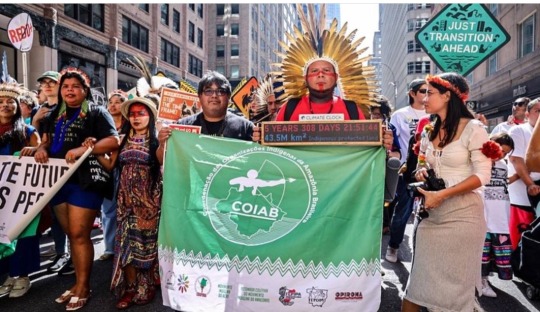
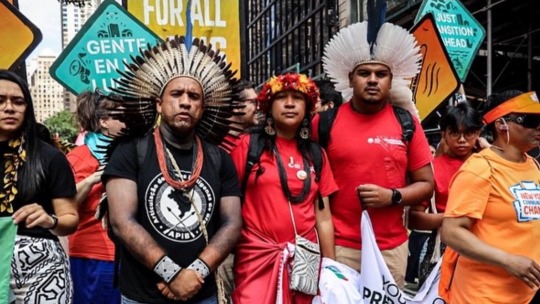
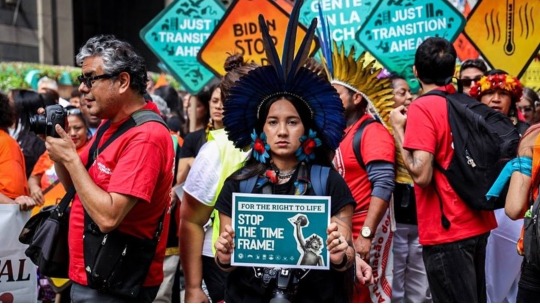
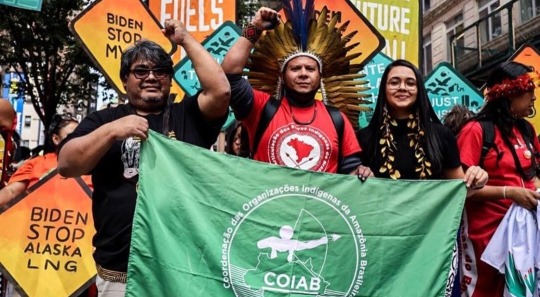
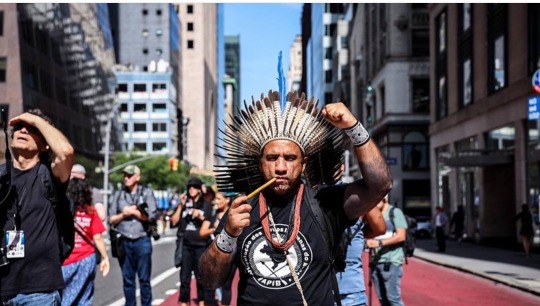
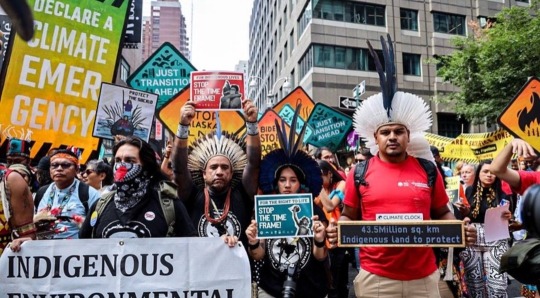
"Trial scheduled for September 20th at the Supreme Federal Court may determine the future of Indigenous Lands in Brazilian territory and be crucial for the global climate. The indigenous movement is mobilizing across Brazil, and an indigenous delegation from Apib is in New York during Climate Week to strengthen the international mobilization campaign in defense of Indigenous Lands rights."
"We are on the land, and the land is within us. If the land dies, we as indigenous peoples die."
The Articulação dos Povos Indígenas do Brasil (Articulation of Indigenous Peoples of Brazil — APIB) is calling for nationwide mobilizations this week and participating in the New York Climate Week to alert the world to the risks of the Supreme Federal Court (STF) judgment scheduled for September 20th. The court will vote on the legitimacy of the legal concept known as the "Temporal Framework," advocated by the Brazilian agribusiness, which could reevaluate Indigenous Land demarcations and impact global climate crisis mitigation efforts.
The Temporal Framework suggests that only indigenous people who can prove they were living on the land in 1988, the same year the Federal Constitution was created, should have rights to the land. This disregards the forced displacements of hundreds of indigenous groups who could only reclaim their traditional lands after Brazil's redemocratization in the late 1980s.
This week, the 15th edition of Climate Week is taking place in New York from September 17th to 24th, alongside the 78th Session of the United Nations General Assembly from September 19th to 23rd, which will feature a speech by President Lula during its opening. A delegation of 10 indigenous leaders is in New York to participate in Climate Week's activities. The international mobilization's goal is to emphasize to the world that the Temporal Framework is a threat to the lives of Brazil's indigenous peoples and could exacerbate the climate crisis, as Indigenous Lands serve as a reservoir of life on the planet.
Apib and its regional organizations are reinforcing mobilizations in territories, cities, and Brasília against the Temporal Framework on September 20th. The goal is to monitor the trial and strengthen the next steps of the indigenous movement's fight. The organizations within Apib mobilized over 220 protests in 21 states, including the Federal District, between May and June.
Five Supreme Federal Court (STF) justices are yet to vote in the trial. The current tally stands at four votes against the Temporal Framework thesis and two in favor. Justices Edson Fachin, Alexandre de Moraes, Cristiano Zanin, and Luís Roberto Barroso have expressed opposition to the agribusiness-backed thesis, while the only favorable votes came from justices appointed by former President Jair Bolsonaro, André Mendonça, and Nunes Marques.
On the same day as the STF vote, the Brazilian Senate attempts to put the Temporal Framework into law. The ruralist caucus in Congress seeks to create tension with the Brazilian judiciary since there is a possibility that the STF may invalidate the Temporal Framework thesis.
In addition to the Temporal Framework, Bill 2903 proposes other setbacks to the rights of indigenous peoples, such as the construction of highways and hydroelectric plants in indigenous territories without free, prior, and informed consent from affected communities. The proposal also aims to allow farmers to enter production contracts with indigenous people, violating the rights of indigenous peoples to the exclusive use of demarcated territories.
While some falsely claim that "there is too much land for too few indigenous people in Brazil," Apib counters that there is too much land for too few farmers and that agribusiness promotes the illegal invasion of indigenous lands. The entity asserts,
"There is no solution to the climate crisis without guaranteeing the rights of indigenous peoples and the demarcation of their territories."
Currently, nearly half of Brazil's land is in the hands of rural producers. Of the total land in the country, 41% corresponds to rural properties, 13.7% to indigenous lands, and 45.2% to other purposes, according to data published in the Official Gazette of the Union. Indigenous Lands are a guarantee of life for indigenous peoples and for all of humanity, which depends on the climate's future.
"As worsening climate crisis unfolds, many will be marked in history as accomplices to the new colonialism threatening the survival of us, indigenous peoples who inhabit the vast territory known as Brazil, and the future of all humanity because there is no solution to the climate crisis without the involvement of indigenous peoples," emphasizes Dinamam Tuxá.
Key activities of Apib during the 15th edition of Climate Week from September 17th to 24th:
On September 17th, Apib participated in the Climate Week march through the streets of New York in support of the Fight Fossil Fuel Strike. The indigenous delegation from Apib denounced the threat posed by the Temporal Framework thesis, highlighted the indigenous emergency situation concerning extractive industries and agribusiness that lead to multiple instances of violence in our territories. Additionally, as part of the Climate Week agenda, it's worth noting that Apib's executive coordinators Kleber Karipuna, Dinamam Tuxá, and other members of the indigenous delegation will participate in a talk on September 19th titled "FCLP: Rights, Participation, and Benefits for Indigenous Peoples and Local Communities in Forest Climate Financing," organized by the Forest and Climate Leaders Partnership. On September 22nd, a portion of the delegation will be present at a dialogue co-organized with H.E Razan Al Mubarak, the current president of the International Union for Conservation of Nature, to assess progress in the COP28 agenda with the aim of collectively identifying meaningful and respectful ways for Indigenous Peoples to engage in the COP.
About APIB
The Articulation of Indigenous Peoples of Brazil (Apib) is a nationally recognized entity within the indigenous movement in Brazil, created from the grassroots up. It brings together seven regional indigenous organizations (Apoinme, ArpinSudeste, ArpinSul, Aty Guasu, Conselho Terena, Coaib, and Comissão Guarani Yvyrupa) and was founded with the purpose of strengthening the unity of our peoples, fostering coordination among different regions and indigenous organizations across the country, as well as mobilizing indigenous peoples and organizations against threats and infringements on indigenous rights.
Support/donate to APIB
APIB Instagram page
APIB Website
#yara.txt#brasil#brazil#latin america#america latina#south america#brazilian politics#brazilian indigenous people#indigenous people#indigenous#native american#native women#first nations#ndn#ndn tag#ndn tumblr#latinoamerica#environmentalism#climate crisis#climate emergency#nature#naturism#naturist#anti capitalism#capitalism#anti colonialism#anti colonization#colonialism#colonization#neocolonialism
188 notes
·
View notes
Text
Sign the petition to help the Brazilian Indigenous people!
((UPDATE: Lula finally announced the PARTIAL veto of Bill 2903, which will be published in the next few days--i can't wait to see exactly WHAT was removed from it. A huge thank you to everyone who signed the petition, liked, and rb the post, you're all amazing!))
TLDR: Greedy Brazilian landowners in the Senate are trying to strong-arm the government into allowing them to steal BR Indigenous lands. Please sign the petition and help them protect their sacred lands and homes!
A few months ago, I posted about the situation of the Brazilian Indigenous people and their fight in the Senate to ensure their right to their ancestral land. The BR Supreme Federal Court voted and, 9x2, decided in FAVOR of the Br Indigenous People...
But that wasn't the end of it. In a disgusting show of unconstitutional disregard for the BR people, the Federal Senate approved Bill 2903, seeking to bypass the Supreme Federal Court and allow for the legalized stealing of Indigenous land.
The vote in the Senate resulted in 43 in favor and 21 against PL 2903. "Among those who supported the legalization of genocide were Senators Marcos Rogério (DEM-RO), who invaded 98 hectares of indigenous land in the Jamari Valley in Rondônia; Jaime Bagattoli, who encroached on over 2,000 hectares of the Rio Omerê Indigenous Land; and Senator Tereza Cristina, former Minister of Agriculture in Bolsonaro’s anti-indigenous government." (APIB, sept 28).
Now, the final decision is in the Br president's hands, and Lula has until October 20th to decide if he'll completely, partially, or not veto the bill at all.
The Br Indigenous peoples need your help! Please sign the petition created by Célia Xakriabá, one of the few indigenous members of the Brazilian Congress, and help us pressure Lula in this critical moment!
168 notes
·
View notes
Text
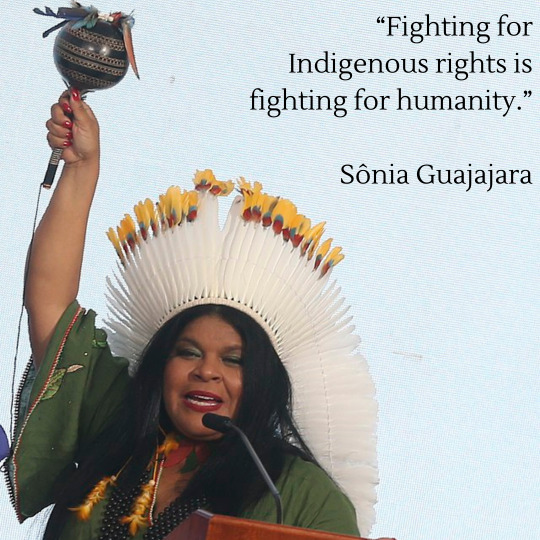
Sônia Guajajara, An Indigenous Trailblazer
Born on March 6, 1974, in the heart of the Amazon rainforest on Araribóia Indigenous Land, Sônia Guajajara embodies resilience, courage, and advocacy for Indigenous rights. She is a member of the Socialism and Liberty Party (PSOL) and has made history as the first Indigenous person to run for a federal executive position in Brazil during the 2018 General election.
As the leader of the Articulação dos Povos Indígenas do Brasil (APIB) (translated as the Articulation of Indigenous Peoples of Brazil, it is a national reference and unifying force within the Indigenous movement in Brazil), Sônia Guajajara represents around 300 Indigenous ethnic groups in Brazil. She fiercely opposes deforestation policies and advocates urgent environmental action, even amidst the challenges posed by the COVID-19 pandemic. Her work at COP26 led to the creation of a $1.7 billion fund for Indigenous peoples and local communities, recognizing their essential role in protecting land and forests from degradation.
In October 2022, she became the first Indigenous woman elected as federal deputy for the state of São Paulo. The same year, Time (magazine) recognized Sônia Guajajara as one of the 100 most influential people in the world. In January 2023, Sônia achieved another historic milestone: she became Brazil’s first-ever minister for Indigenous peoples.
Her leadership is a beacon of hope, challenging the status quo and amplifying Indigenous voices globally.
#sônia guajajara#indigenous#indigenous rights#indigenous women#indigenous people#indigenous peoples#native#natives#brazil#brasil
12 notes
·
View notes
Text
I just need to vent
I'm so depressed. But it feels different from my Capital D Depression because at least when I take medication my Capital D Depression chills out.
Like it feels physically different. I remember what it felt like before I was medicated, this does NOT feel like that. I remember how I would talk to myself before and it is not like that.
I honestly don't think i can pills and therapy my way out of this one.
I can't get out of this goddamn funk because I'm stuck in a living situation that is actually capital H Hell because somehow I am perpetually unlucky.
It's the first day of school again and once again I am at home with no job. Everyone tells me I'm good at teaching, I never get negative feedback when I'm observed, students and parents like me BUT SOMEHOW I never get to keep a job! Somehow there is always someone better and more qualified than me! HOW IS THAT STILL POSSIBLE I've been teaching for 12 years!!! I've taught literally every grade and every version of language arts offered in our district, from newcomer english to APIB. But then I see people fresh out of college getting hired and I think - is it me??? Am I doing something wrong??? nobody tells me I am but I can't get a job so clearly it's me???
I live in one of the pockets of Red in CA so our district is very conservative, and I'm hearing talks of book bans and parent rights and CTR and I know I'm not Out but I wonder if it's that, or if I should even be staying here at all.
But then I can't leave because I can't make the money to afford moving!
My normal outlets and coping strategies don't help because it's inescapable. And now internet 3.0 is sucking out what little joy I was getting from those things.
I make things and I want people to see them and say something, but I spend hours on a painting and I get no response. I ask questions and nobody answers. And I think "ah, but you should make things because you love to make them, not because of the attention it brings you" but YOU KNOW WHAT IT WOULD JUST BE NICE IF LITERALLY ANYONE TOLD ME I WAS DOING A GOOD JOB AT ANYTHING?
I'm so TIRED of clearly being good at my job, being good at writing, being a good artist, and yet I get NO acknowledgement from people UNLESS I have predicated it with self deprecation or shove it into people's faces and ask them directly "Hey tell me you like this".
And I KNOW this is 100% not because I'm bad at what I do. It's because the way things are structured now on the internet makes it basically impossible for me to be seen by anyone who isn't already looking for me. And maybe I wouldn't be so dependent on it if I hadn't come from an adolescence Old Web where it was a lot easier to discover and talk to other artists and I had people communicating with me directly about what I was making instead of just liking it and leaving it in the void.
And I WANT to decouple myself, I want to not feel like I NEED the numbers to go up to be happy, but I can't STOP sharing things online because I'm becoming more and more isolated and it's the only way to share things with the people who DO care. Friends I've had my whole life are moving away from me in the physical world, and online friends i've known for decades are disappearing in waves because of policy changes and then they're just Gone. The internet is the only way I can keep in touch with people but it's ALSO my biggest tormentor because every SECOND someone isn't talking to me I feel as though I'm being purposefully ignored.
BUT every second someone IS talking to me it becomes a guilt spiral of "ah shit, how have I guilted this person into pitying me because Evidence shows people would MUCH rather not talk to me." And I KNOW that's not true!!!! People have lives outside me!!! But my world is getting smaller and smaller and feels more and more empty and the best thing to do is LEAVE and let my world get BIGGER with MORE THINGS in it but I can't AFFORD to leave and nobody around me is obligated to drop what they're doing to make me feel like the world isn't ending.
AND YEAH IT FEELS LIKE THE WORLD IS ENDING.
I don't want to feel that way but I do!!!!! I feel like everything is on the verge of collapse, and who is going to need ME when the world ends? Nobody! Nobody will ! They all have someone else they'd turn to first and I WOUDN'T WANT THEM TO ANYWAY! What good am I??
I just need everyone to stop what they're doing and HOLD me and tell me I did the best I could??? How selfish! How self centered! Who am I to ask that!? The world is ending and all I can think about is me.
AND IT'S SO FRUSTRATING BECAUSE I KNOW. I KNOW IF I JUST HAD AN INCOME NONE OF THIS WOULD BE HAPPENING TO ME. I don't feel this way when I'm working, even on my VERY meager teacher's salary! But I can't keep a job long enough to GET OUT OF HERE. I just work JUST long enough to have hope, and then I'm unemployed again!
I JUST WANT TO LIVE! I JUST WANT TO HAVE A PLACE THAT IS MINE! I JUST WANT TO LIKE WHO I AM AND WHAT I DO! AND I JUST WANT SOMEONE TO SEE ME AND I KNOW I'M SEEN AND THAT'S ENOUGH.
and the worst part is i know i will be refreshing this all day hoping to see SOMEONE, ANYONE commenting. because number goes up. and that will feel good for ten minutes.
7 notes
·
View notes
Text
Today (12/14/2023) Brazil's National Congress overturned the vetoes made by Lula regarding a bill (now a law) that Indigenous peoples denounce as the "Law of the Indigenous Genocide", the Marco Temporal / Time Frame Law.
According to the pamphlet APIB (Articulação dos Povos Indígenas do Brasil, in English, "Articulation of the Indigenous Peoples of Brazil") made on September of 2023:
Marco Temporal is a legal thesis defended by the Brazilian agroindustry that proposes that only territories occupied by indigenous peoples on October 5, 1988, date of enactment of the Brazilian Constitution, may be legally acknowledged and demarcated. Marco Temporal is a perverse and unconstitutional political and legal interpretation, which ignores that due to centuries of persecution and extermination, many indigenous peoples were expelled from their territories. On June 7, the Federal Supreme Court (STF) resumed the ruling of the Time Frame, related to the case of the Xokleng People and of national application. The Brazilian Supreme Federal Court (STF) is judging the Marco Temporal thesis, an anti-indigenous thesis that restricts the right of Indigenous peoples to the demarcation of their lands. The thesis, considered unconstitutional, states that Indigenous peoples would only be entitled to the demarcation of lands if they were in possession of them on October 5, 1988, the date of the promulgation of the Brazilian Constitution. If accepted by STF, 14% of Brazilian territory and biodiversity living inside the Indigenous Territories would be vulnerable in the face of the expansion of illegal commodity production, land grabbing, illegal mining and deforestation.
The full pamphlet can be read here. More can be read on APIB's page about the Marco Temporal.
The only points that remained vetoed were (source):
The part of the law that would allow contact with voluntarily isolated Indigenous peoples (who have never been in contact with whites/non-indigenous peoples and don't want to be);
The authorization of use transgenics in Indigenous land;
The assertion that part if the cultural "markers" of an Indigenous people have "changed" enough or been "lost" (accordingly to white politicians, legislators, etc) then they have no right to their land.
The last point had been denounced as racist and assimilacionist, and it ignores that Indigenous cultures aren't static (as any culture changes with time, specially under repression) and, of course, that white people don't have the right to decide who is Indigenous or not.
Some of the consequences of the law, according to APIB's pamphlet are:
3. Allow the construction of highways, hydroelectric plants and other enterprises in ILs, without prior, free and informed consent; 4. Authorize farmers to promote direct contracts with indigenous peoples to plant soy, raise cattle, making it possible to promote even illegal and industrial mining in ILs; 5. Allow anyone to question the processes of demarcation of indigenous territories, including those already demarcated; 6. Recognize the legitimacy of land tenure by invaders of Indigenous Lands, facilitating land grabbing;
The results will be felt in the rest of the world as well because the exploitation of the land for cattle, soy, mining, and others are exactly what drives deforestation and the resulting climate catastrophes in the Brazilian biomes such as the Amazon rainforest, the Cerrado, etc. Indigenous people take an active role in protecting such areas.
As the texts says, many Indigenous peoples have been expelled from their land and returned at a later point in time.
The Brazilian Constitution of 1988 came after the Dictatorial Period, which killed around 8000 Indigenous people (of ten studied peoples, while Brazil has around 305 recognized indigenous peoples/ethnicities nowadays) (also consider that some of these ethnicities have at times "disappeared" and "reappeared" times later because people stopped claiming them to avoid violence and racism).
The Indigenous movement in Brazil has declared this to be an Emergency (as they did during the beginning of the Covid-19 pandemic, which affected Indigenous peoples in a disproportionate manner).
They will also register a Ação Direta de Inconstitucionalidade (Direct Action of Unconstitutionality); which is a legal action submitted to the STF that seeks to declare this law as unconstitutional and annul it.
To help them:
Donate:
Sign and share their petition:
For fellow Brazilians (or people who understand Portuguese and want to help), they have a WhatsApp group where they send news regarding the developments and suggest ways to help.
In their pamphlet they also ask for people to help in other ways such as:
Following their social networks (all of them are in Portuguese for now): 1 / 2 / 3 / 4;
"Take photos, videos and share the contents of the indigenous campaign on your social networks" and tag them
"Mobilize authorities, celebrities and influencers"
"Organize protests in front of Brazil’s Embassies, Universities, at the European Parliament, etc."
Most of the movement is articulating itself in Portuguese so it's not something people who aren't familiar with the language can as easily access/read about, but please keep what's happening to Indigenous peoples in Brazil in mind, and help if you can!
#brazil#anti indigenous racism#racism#genocide#txt#stances#idk how else to tag this!!#mari shares#indigenous peoples
3 notes
·
View notes
Text
Change.org will not do anything.
On the website there is a link to a donation page to the APIB which would have been much more useful for the OP to share instead.
We need everyone's help right now to protect the rainforest and Indigenous People
The Amazon Rainforest is under a massive threat. I know you've heard this a million times, but this is different. There is a piece of legislation that will decimate the rights of Indigenous people of Brazil, who have been protecting the rainforest. It's unfathomably bad. It has majority support. And they're voting tomorrow. As reported here, the Bill allows "the Brazilian government to find energy resources, set up military bases, develop strategic roads, and implement commercial agriculture on protected Indigenous tribal lands, without any prior discussion with the affected peoples."
The thing you can do—and I know this sounds overly simple—is sign this petition—and tell your friends to do the same: SIGN HERE.
As reported here, the Bill allows "the Brazilian government to find energy resources, set up military bases, develop strategic roads, and implement commercial agriculture on protected Indigenous tribal lands, without any prior discussion with the affected peoples."
Again, this bill has majority support. You may be wondering, why will a petition signed by people who don't live in Brazil make any difference? Because it will give those opposing it political air cover. It will show the world is with them.
But we need a LOT of signatures.
Please do this simple act and spread the word.
#I have seen this about 5 times reblogged sorry if I sound salty#change petitions are useless we figured this out like 3 years ago#It's irresponsible of OP not to have shared the org's donation page when THAT is what will actually meaningfully help
51K notes
·
View notes
Text
Apib aciona STF contra lei que altera modelo de ensino no Pará
A Articulação dos Povos Indígenas do Brasil (Apib) acionou o Supremo Tribunal Federal (STF), por meio de uma Ação Direta de Inconstitucionalidade (ADI 7778), para contestar uma lei estadual recente do Pará que alterou aspectos referentes à carreira de professores da rede estadual de ensino. A avaliação da Apib é a de que a incorporação do modelo online em certas regiões pode fazer com que alunos…
0 notes
Text
Apib questiona alterações sobre educação indígena em legislação do Pará
Entidade argumenta que nova norma revogou sistema que garante professores em comunidades indígenas. Continue reading Apib questiona alterações sobre educação indígena em legislação do Pará

View On WordPress
0 notes
Text
Lançamento exclusivo: Resistência Mbya 1.2
Não digo isso com a intenção de julgar outros povos, mas sei que meu povo é um exemplo a ser seguido, e uma inspiração de resistência e minha intenção é exaltar meu povo. Por isso não temos medo. Os que se rendem, no universo, são minoria, sempre foram , pq nosso Nhanderu hete é o mais poderoso. Resistência Mbya – 2024 set 16 Jdewete! Artista, guardião da Mata Atlântica, ARTivista independente…

View On WordPress
#craftanddesign unwind sydney influencer css marketing blogpost#arte independente#Associação povos indígenas Brasil APIB#Comissão Guarani Ywyrupa CGY#defensor de todos biomas Abya Yala#Existe Guarani em SP#inspiração resistência#Jdewete!#José de Alencar book livro#Lançamento exclusivo: Resistência Mbya Edição Ao Vivo / On-line#lançamento oficial#literatura brasileira indígena#mais poderoso#minoria#Mirindju Glowers. Indígena Mbya. Guardião da Nhe’ery Mata Atlântica#mirinjdu mano glowers#nosso Nhanderu hete#o Guarani opera#povo universo#produção independente#Terra Livre Mano Glowers rewe (com M.G). Mirindju Glowers
0 notes
Text
Iniciativa busca el protagonismo de la sociedad civil y una agenda ambiental justa, popular e inclusiva. Por Mariana Castro Hemos llegado al año de la 30ª Conferencia de las Naciones Unidas sobre el Cambio Climático (COP30) , que debería reunir en Brasil a los principales líderes mundiales. Paralelamente al evento, en todo el mundo, más de 400 movimientos populares y organizaciones de la sociedad civil están construyendo la Cumbre de los Pueblos, que debería denunciar los fracasos en la lucha contra la crisis climática y presentar agendas de demandas populares. “Esperamos construir un gran trabajo de base en todo el país y a nivel internacional, llamando al mundo a construir una Cumbre de los Pueblos que proponga una transición ecológica, popular y soberana en la que los territorios y los sujetos estén en el centro del debate, que el pueblo sea el centro del debate Por eso, este año estaremos construyendo varias iniciativas que hagan popular y accesible el debate sobre el clima, la transición energética , la preservación y conservación ecológica global”, explica Pablo Neri, de la dirección nacional del debate. Sin Tierra (MST). Las organizaciones se reúnen en diferentes espacios desde agosto de 2023, para construir propuestas que tengan como eje principal la crisis climática y sus consecuencias, según explicó Márcio Astrini, secretario ejecutivo del Observatorio del Clima. “Todo lo que sucede en esta agenda climática, todo lo que sucede en un evento extremo, siempre tiene un destinatario claro y directo, que son las poblaciones vulnerables, las más pobres, las que hoy ya sufren porque están en situación de marginación o están en situación de de no participar en la toma de decisiones son los que más sufrirán, son los que sufrirán las consecuencias más dolorosas de la crisis climática”, afirma. – Organismos nacionales e internacionales suman esfuerzos en la construcción de agendas colectivas / Reproducción Los pueblos indígenas también son parte de la construcción de la Cumbre de los Pueblos y refuerzan su papel histórico en la defensa del medio ambiente. Este será incluso uno de los temas principales del Acampamento Terra Livre , la mayor asamblea de pueblos y organizaciones indígenas de Brasil. “Estaremos en la ATL 2025 trayendo como uno de los temas principales el viaje y el enfrentamiento de la crisis climática como una estrategia que también combina esfuerzos para pensar el impacto de los pueblos indígenas en la COP30, en Belém y, también, durante todo el año como un En conjunto, varios otros eventos en los que estaremos participando, estaremos llevando la agenda del movimiento indígena, como la Asamblea General de las Naciones Unidas para los Pueblos Indígenas”, explica Kléber Karipuna, coordinador ejecutivo de la Articulación de los Pueblos Indígenas. de Brasil (Apib). Karipuna señala también la urgencia de que las agendas populares sean protagonistas en las negociaciones entre países, impulsando políticas públicas y acciones concretas que garanticen la justicia climática y la protección de las personas y territorios más afectados. “La respuesta somos nosotros. La respuesta somos nosotros, los pueblos indígenas, los quilombolas, los ribereños, los extractivistas. La respuesta somos todos nosotros y ustedes, que tenemos la responsabilidad de afrontarla y evitar una crisis que se expande y en la que ya no podemos trabajar. afrontar esta crisis en el futuro”. Desde Chile, el director para América Latina y el Caribe de la Campaña Global por la Justicia Climática llama a la sociedad civil, movimientos y organizaciones globales a sumarse a la Cumbre. “Queremos invitar a todos a sumarse a este amplio proceso de convergencia social, que involucrará a todas las regiones del mundo y a todos los sectores sociales, no sólo a las organizaciones socioambientales y de justicia climática, a las mujeres, a la diversidad, a los niños, a los jóvenes, a los pueblos indígenas. , los pueblos, los tr...

View On WordPress
0 notes
Text
Brazil's indigenous mull over abandoning negotiation with farmers

A Supreme Court-led commission aimed at resolving stalemates over indigenous land rights regulations began its work on August 5. Right from the bat, however, representatives of native communities have contemplated withdrawing from the negotiations altogether.
The Indigenous People’s Coordination (Apib) plans to consult with grassroots leaders on whether to continue participating in talks about land rights regulations. A final decision will come within the next few days, Apib told The Brazilian Report.
Last year, a 9-2 Supreme Court majority ruled that land rights must be granted based on ancestral connections to a given territory. In contrast, agribusiness lobbies have pushed for October 5, 1988 — the date the Brazilian Constitution was enacted — as the cut-off point for land rights.
Under this “time frame argument,” if an indigenous group could not prove it was occupying or contesting land on that date, it would not have a valid territorial claim.
Continue reading.
#brazil#brazilian politics#politics#environmental justice#indigenous rights#farming#image description in alt#mod nise da silveira
15 notes
·
View notes
Text
XTransfer Selected as Constituent Company of "Corporate Innovation Index 2024" by CUHK
HONG KONG SAR – Media OutReach Newswire – 19 December 2024 – XTransfer, the World’s Leading & China’s No.1 B2B Cross-Border Trade Payment Platform, proudly announced it has been selected as a constituent company of the Corporate Innovation Index (CII) 2024, published by the Asia-Pacific Institute of Business (APIB) at The Chinese University of Hong Kong (CUHK). XTransfer is the only cross-border…
0 notes